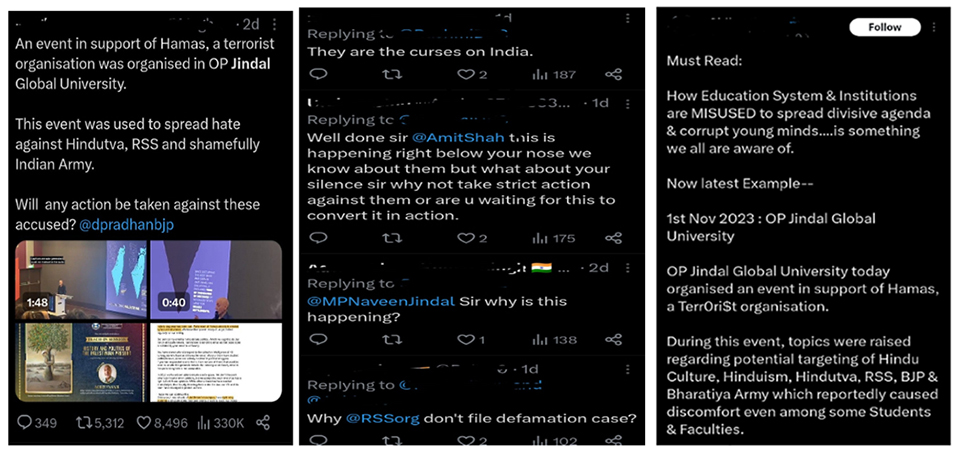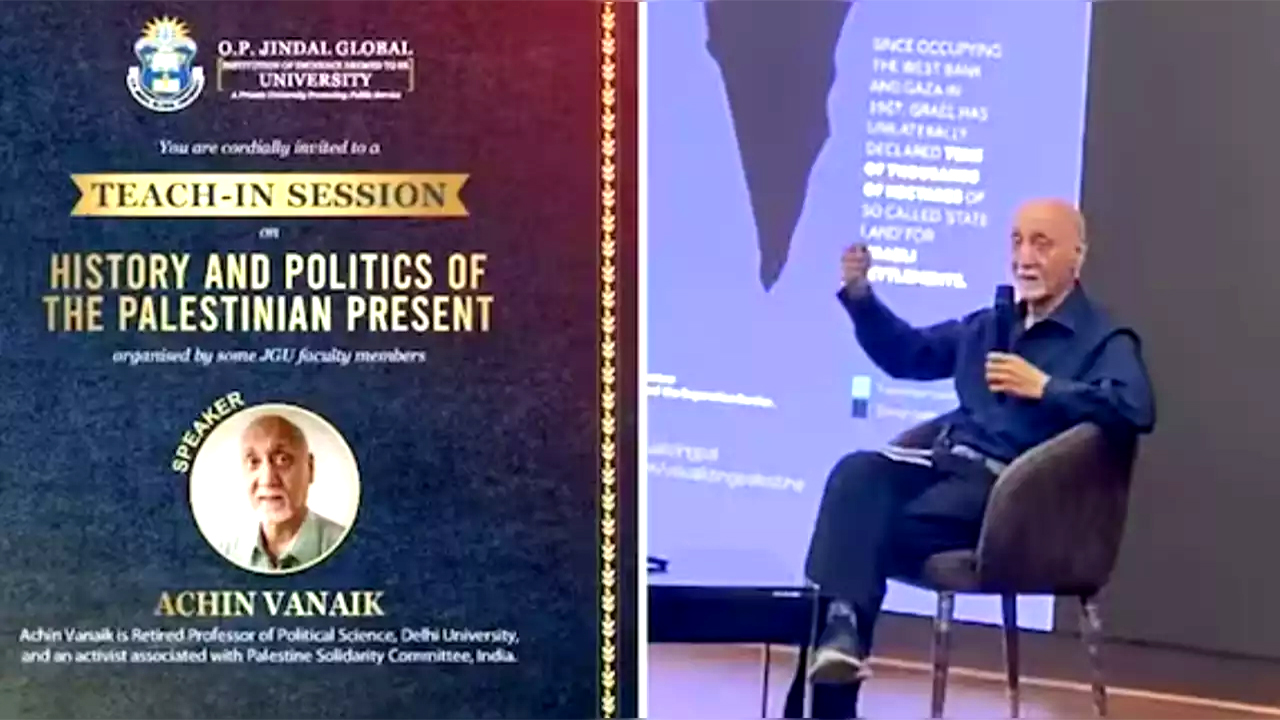A student’s perspective on the recent controversy surrounding Prof. Achin Vanaik’s teach-in session on Palestine at O.P. Jindal Global University and the consequent dissemination of misinformation and targeting of faculty members by the right wing ecosystem from within and outside the university.
By Samyuktha Kannan
Nov 04, 2023
On the 1st of November, some faculty members at O.P. Jindal Global University organised a teach-in event under the title ‘The History and Politics of the Palestinian Present,’ by inviting Professor Achin Vanaik, a retired Professor of International Relations of Delhi University, who has also been a lifelong activist. Firstly, I am thankful to the faculty organizers of the teach-in for conducting this event. The event’s triumph was unmistakable, evident in the overwhelming turnout of students in the audience. Throughout my three years at the university, I have never seen the auditorium so full that I had to sit on the staircase with a plethora of other attendees, due to lack of seats. These types of gatherings infuse a revitalizing energy into the essence of this private university.
Initially conceived as an informative ‘teach-in’ for the enrichment of both faculty and students, the event sought to contextualize and provide insight into the complex Israel-Palestine conflict, notably in the face of widespread misinformation and propaganda. However, it quickly became the target of intense opposition from radical Hindu factions, both affiliated with and external to the university, particularly amplifying their dissent through various social media platforms. This unexpected turn led to the dissemination of further misinformation, not only decontextualising what was really said at the event but also maligning Prof. Achin Vanaik along with targeting other faculty members of the university. Within hours of the talk ending, my X feed (formerly twitter), was filled with multiple posts on how O.P. Jindal Global University organised “an event in support of Hamas, a terrorist organisation”, how the speaker “criticized Hindus, India and Indian Army” allegedly causing “discomfort among some students and faculty”.
What was intriguing was that in the due course, even students within the university began spreading this fake news on their social media accounts. I can affirm, as I was present, that none of these students seemed to have attended even a few minutes of the lecture. How can one offer criticism to something they have never engaged with? Furthermore, the question arises as to why all the video clips of the lecture, which have been circulated on social media, not only lack engagement but are also alarmingly stripped of the necessary context?
What was meant to be a forum for critical discourse and engagement on the matter was abruptly stifled due to the backlash of so called ‘nationalistic’ discourse. Not only was the event ‘cancelled’ by the ‘woke’ crowd, but there are now faculty members at the university confronting threats for their involvement in and their vocal support of the said event. While I personally hold a different standpoint from the rather problematic position taken by Prof. Vanaik, who engaged with the issue from a rather privileged and elite intellectual standpoint (which I will talk about in sometime), to engage with such complicated questions is one, and to create an unsafe and uncritical space for knowledge production and intellection is another. The desire among many of us to engage in a more nuanced discussion regarding the points raised had to take a backseat. Instead, we were compelled to address the onslaught from the right-wing Hindu X ecosystem. Thus, making us shift focus from the intended discourse. The way the right-wing ecosystem, both on and off campus, seemed to be making a spectacle of the entire event on social media, seemed almost as if a conscious effort was made just to deviate critical engagement on the issue.
Although I harboured a few inquiries that I intended to engage with at the conclusion of the talk, I found myself unable to do so due to time constraints. At the start of the lecture, Professor Vanaik articulated his perspective on how Israel embodies a settler colonial, apartheid state rooted in genocide, racism, exclusion, and violence. He notably seemed to explicitly suggest that the crisis at hand might not have a feasible solution, considering that the ‘two-state solution’ has lost its relevance or viability. He suggested a ‘one-state solution’ and that one state being the state of Israel. It seems that the Western academic sphere, in conjunction with the elite professorial class, has come to acknowledge the limitations of the two-state solution. Now, their support leans toward advocating for the fundamental human rights of Palestinians within the Zionist state of Israel. The gumption of the professor to suggest this on behalf of the Palestinians who have died in lakhs and suffered at the hands of the Zionist state and are undergoing the worst genocide of the present times was something that we wanted to engage with.
For a minute if we take this argument, its futility is inbuilt into the idea of the Zionist state itself, the basis of which is an exclusive Jewish identity, which they wouldn’t want to tamper with. This has been made clear by the leaders of the Zionist state time and again. Mr. Vanaik was of the view to suggest that Palestinians today must negotiate and ‘ask’ for basic rights from a state that is carrying out their genocide right now. So according to him, the fight has to be, not against settler colonialism but against the apartheid. The fight has to be for the ‘rights’ over and above the pursuit of freedom, existence, respect, dignity, and life.
However, this standpoint appears to reek of the same liberal ‘violence to no-one’ discourse that seemed absent during the entire history of Israeli settler-colonialism/apartheid and the current genocide. Moreover, as far as I know, with my engagement with other teach-ins all across the globe and conversations with activists, intellectuals and other professors rallying for the Palestinian cause, no one appears to be taking this position. Mr. Vanaik’ s talk seemed to suggest that he was taking this deeply problematic position on behalf of the Palestinians. And this is where my second issue lies. By taking a view of negotiations, ‘peace talks’ and a ‘non-violent’ resistance by the Palestinians who are being systematically, inhumanly killed in hundreds, and by trying to speak on their behalf from the comfort and safety of academic space, Mr. Vanaik is not only in deep non-alignment with the Palestinian cause, but he also seems to be downplaying the revolutionary subjectivity of the resistance movement. The revolutionary subjectivity that yearns for independence and freedom through a struggle against imperialism and colonialism.
It is ironic that Prof. Vinaik started his talk with quotes by Ilan Pappé and Edward Said, both of whom are leading political scientists, thinkers and activists and have many times voiced criticisms of the Israeli occupation. The speaker made references to the same Ilan Pappé, who in a recent article, called for freedom of Palestine from the river to the sea and the same Prof. Said, who I’m sure would be turning in his grave for being used in a talk which assumes such a liberal façade. The hypocritical professorial class all over the world is complicit in this genocide by presenting viewpoints that either directly or indirectly hint at the erasure of Palestine by whitewashing the crimes of the settler colonial state and the western imperial politics. I remember reading an activist scholar who wrote an article titled ‘This Is What ‘Decolonization’ Looks Like’, wherein the author explains how ‘Fancy-sounding academic jargon’ is all about just writing papers on decolonization, presenting in conferences, getting grants, scholarships, careerism, jobs etc. The silence from individuals who have built their careers around terms like decolonization and the like is appalling. This moment demands not just speaking out but also taking concrete action!
Second issue was with the idea of ‘democracy’ that Prof. Vanaik was suggesting we have to embed. Look where it has gotten us. All undemocratic things happening right now, both in India and in Israel, seem to be happening under the garb of democracy. We have a majoritarian and a populist government that a multitude of scholars and activists are calling fascist. We have something scholars are calling authoritarian constitutionalism and a permanent emergency all in the name of the ‘mother of democracy’. Let the delusion of democracy not allure you too much professor. We are living it. Please don’t suggest it to Palestinians! The onus of democracy is not on the Palestinians!
The third issue was on the nature of violence and the discourse of counter-violence, I won’t say anything about that here. It is a trigger for the liberals and other groups who are masquerading as ‘leftists’ and selectively engage with the condemnation of violence insofar as it gives them some radical capital. The so-called ‘leftists’ who stayed silent throughout historical Israeli settler-colonial violence and found a voice to condemn counter violence as if history itself began only on 7th October 2023.
These were the questions I wanted to engage with, if not with Mr. Vanaik, then at least in, what I assumed, would be a safe space for knowledge production and critical engagement on campus. However, this reactionary response from the Hindu right-wing ecosystem both on and off campus, has not only nipped progressive discourse in its bud, but has also unnecessarily dragged professors and organisers into it, accusing them for ‘brainwashing’ and threatening them with UAPA. Somebody on X, has even asked Prime Minister Modi to ‘do something’ about these ‘Anti-Bharat institutions …conspiring against its own people’. I wonder what that ‘something’ is!
What is unfortunate however, is that a major portion of all the online hate is directed towards a particular faculty in the University. The said professor was neither in the audience nor an organizer of this event. All the hatred, anger and the wrath is due to their identity. Thus, here, the threats, accusations and discourse cancellation are not just politically motivated, they are also deeply communal, ideological and identitarian in nature. Private Universities as a space, with their elite, upper class students, are increasingly moving towards de-politicising the campus of anything that goes against majoritarian, communal and sectarian discourse. The class nature of these universities is such that there appears to be no need for them to engage with progressive politics as the present one conveniently swings in their favour. Attempts to discharge the university space of ‘deviant’ or ‘unruly’ politics is not just giving support to the dominant right-wing narrative, it is also ridding the institution of any ‘safe’ space to critically engage in issues that demand so.
Frankly, I was appalled when I saw students showcasing blind hatred against something they had not even been a witness to. What are university spaces without knowledge production and intellection based on reflection and critical engagement? And what is knowledge production without a ‘safe space’ for learning? The reactionary Hindu-right with its ideological state backing, has not only made the nationalist discourse majoritarian and communal, it has now started seeping into the hitherto ‘open’ and intellectual space of the university, making what was once safe; unsafe and vitriolic. This is the beginning of an era of the death of knowledge production in India and thus the ‘modern-liberal’ university which is casteist, communal, sectarian, misogynistic, and patriarchal. An era of the death of discourse, thought and volition.
(Samyuktha Kannan is a student of O. P. Jindal Global University.)



Lol who cares